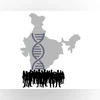However, Hariharan said that the project needs a much larger scale and requires simultaneous collection of both health and genetic information.
“Modern genome databases in the US and Europe have reached half a million or more in size, and Pakistan is already close to 100,000,” said Hariharan. “If the government were to continue the start given by the 10K project and scale it up to hundreds of thousands, if not millions, and also capture associated health information, it could enable the genomics research community, Strand Life Sciences inclusive, to understand diseases better and look for cures."
Strand, which is a subsidiary of Reliance Industries Limited, said it is ready for significant growth as it scales up its operations to meet the rising demand for genomic solutions. With a focus on expanding its global footprint, the Bengaluru-based company is strengthening its research and development capabilities, particularly in precision medicine and artificial intelligence (AI)-driven diagnostics. The firm is investing in state-of-the-art infrastructure, enhancing its genomic testing platforms, and forging strategic partnerships with other players. By leveraging cutting-edge technologies and big data analytics, Strand aims to accelerate the adoption of personalised healthcare solutions, transforming the way diseases are diagnosed, treated, and prevented on a global scale.
)












